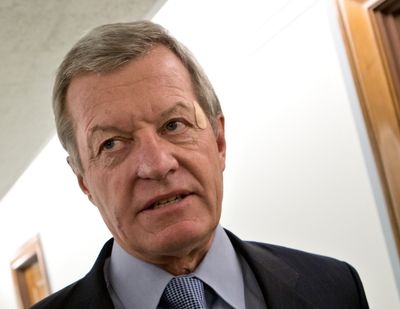Sen. Max Baucus to retire at end of term
Montana senator is sixth Democrat who plans to leave

Democratic Sen. Max Baucus of Montana, who sometimes crossed his party in the powerful role of Finance Committee chairman, announced Tuesday he would retire at the end of his term, complicating Democrats’ efforts to keep control of the Senate in the 2014 midterm elections.
The move caught many in Washington by surprise. Baucus had stockpiled $5 million – a fortune by Montana standards – and voted last week to oppose compromise gun control legislation, which some viewed as a calculation aimed at winning re-election in his libertarian-leaning state.
Back home, however, it was known that Baucus, 71, has been quietly weighing his future for some time. He recently announced plans to move from Helena, the state capital, and build a new residence in Bozeman with his third wife, a former aide. The two married in July 2011.
“I don’t want to die here with my boots on. There is life beyond Congress,” Baucus said in a telephone interview with the Associated Press.
While Baucus was no shoo-in for a seventh term, his decision to step aside means Democrats will have yet another open seat to defend next year, when the party faces the headwinds that typically accompany a president’s second midterm vote. Five other Democrats have announced plans to retire; three of them, like Baucus, come from Republican-leaning or toss-up states.
In all, Democrats will have to defend 21 seats to 14 for the Republicans. Counting independents who caucus with them, Democrats now hold a 55-45 Senate majority.
Baucus, a fifth-generation Montanan, was elected to the Senate in 1978 after two terms in the House. He became the top Democrat on the Finance Committee in early 2001. He has held the position ever since on the panel – which has jurisdiction over taxes, Medicare, Medicaid, health care and trade – as chairman when his party held a majority and as senior member of the minority when Republicans were in power.
The panel has a long tradition of bipartisanship, but Baucus ascended to power in an era of increasing partisanship in Congress.
Many Democrats were unhappy when he worked with Republicans to enact the tax cuts that President George W. Bush won in 2001. And then again in 2004 when Congress pushed through a GOP plan to create a new prescription drug benefit under Medicare, a measure that most Democrats opposed as a giveaway to large drug companies.
Baucus stood with fellow Democrats in 2005 when Bush proposed legislation to partially privatize Social Security, an epic battle that ended in defeat for the president’s effort.
He played a central role in the enactment of Obama’s watershed health care legislation in 2010, although some inside his party complained that precious momentum was lost while he spent months on bipartisan negotiations that ultimately proved fruitless.
More recently, Baucus has expressed opposition to Democratic proposals to use an overhaul of the tax code as a means of raising additional revenue. He was one of four members of his party to oppose the budget the leadership brought to the floor with a requirement to that effect.
On other issues large and small, Baucus’ voting record reflected his rural state.
Most recently, he voted against legislation that Obama backed to expand background checks for gun purchasers.
Sen. Jon Tester, D-Mont., said he learned of the retirement plans on Monday. He said Baucus told him he wanted to return to Montana, and noted that if he waited until the end of his next term he would be nearly 80.
Baucus, in the interview with the AP, said: “Been here 40 years. No regrets. It is time to do something different.”
Maneuvering began almost instantly for the 2014 race.
Baucus’ decision immediately turned the focus to Montana’s popular former Democratic governor, Brian Schweitzer. Outspoken and flamboyantly folksy, Schweitzer would be a prohibitive favorite for his party’s nomination and probably the strongest Democrat in a general election.
Schweitzer, 57, declined Tuesday to say if he would run for Baucus’ seat but wouldn’t rule it out. Since leaving office in January, he said, he has focused exclusively on an effort to take over the state’s financially struggling Stillwater mine as part of an investor group seeking to save its roughly 1,600 jobs. A shareholder meeting is set for May 2, and Schweitzer said he would make no decision until afterward.
“I’ll look around once I climb that mountain,” said Schweitzer, who served two terms as governor. “There should be a pretty good view from there.”
Possible Republican candidates include former Gov. Marc Racicot; former Rep. Denny Rehberg, who lost to Baucus in 1996 and to Tester last fall; former Rep. Rick Hill; and Rep. Steve Daines. State Sen. Champ Edmunds, of Missoula, and former state Sen. Corey Stapleton had already announced they would run against Baucus.